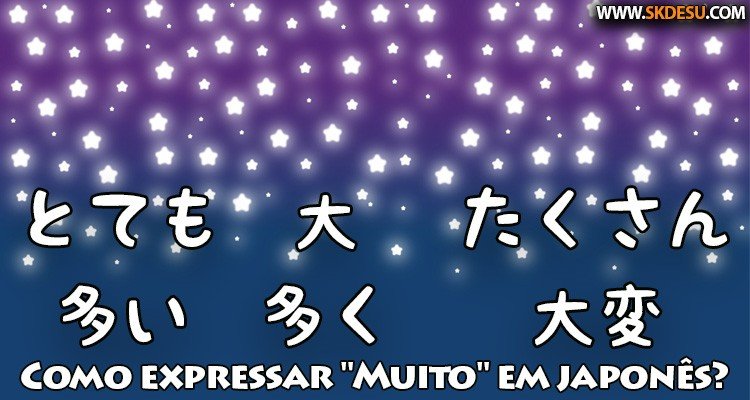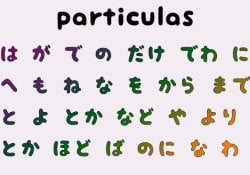There are several ways to express "a lot" or a large amount in Japanese, some of these ways are totem, ooku, plenty, hi, etc. But what is the difference between each of them? When to use each? Are there other ways? We will answer all these questions in this article.
TOTEMO [とても] - Adverb of much
Totemo [とても] or [迚も] is an adverb meaning “very; excessively” and is often used to modify adjectives. O totem it is used more to express feelings, while the other options that we will see below, it is usually used more to express quantity and abundance of things.
Usage examples of Totemo
Responsive Table: Scroll the table sideways with your finger >>
| 彼はとても思慮深い人だ。 | Kare wa totemo shiryobukai hitoda. | He is a very thoughtful person. |
| 彼はとても疲れていた。 | Kare wa totemo tsukarete ita. | He was very tired. |
| 夜、とても暑い。 | Yoru, totemo atsui. | The night is very hot |
| とても大好き | Totemo dai suki | I love so much |
DAI [大] - Very Big in Japanese
Dai [大] can also be translated as “much; big” when used together with some words like [好き]. [大好き] means an even greater love, and together with [とても] it becomes more powerful.
Instead of [とても] you can try using different expressions like:
- かなり - Kanari - Considerably; quite
- 特に - Tokuni - Particular; especially
- 本当に - Hontouni - Really; truly
- すごく - 凄く - sugoku - Extremely
- 超 - チョー - cho - Super
- めっちゃ - meccha - ridiculously
- 結構 - kekkou - Splendid; Good; amazing; quite
- 相当 - soutou - Considerable; substantial; extremely
- 随分 - zuibun - much; extremely; surprisingly; considerably
- 極めて - kiwamete - Quite; extremely; decisively
- とんでもない - tondemonai - Unthinkable; unexpected; outrageous
- Excessively Too much; excessive; superfluous; surplus; not necessary
- 余程 - yohodo / yoppodo - Translation: Distance - yohodo / yoppodo - Much; largely; quite
- 前代未聞 - zendaimimon - unprecedented; unprecedented; unparalleled; record
Try to get out of the [とても] a little bit and make your sentences richer by using these different expressions.

OOI [多い] - Adjective of many
Ooi [多い] is an adjective meaning "many / a lot", however you cannot put a noun after this adjective. For example, see the sentence "There are many people" written below:
- Wrong: 多い人がいます - Ōi hito ga imasu
- Correct: 人が多いです - Hito ga ōidesu
Not just this one, but there are some adjectives that cannot be used before nouns. Only in cases where you have a relative clause. That is, when the adjective [多い] does not modify the following noun, for example:
- I went to a crowded town
- I went to a city where there are a lot of people;
The article is still halfway through, but we recommend also reading:
OOKU [多く] - Too big
Ooku [多く] means “many; much; largely; abundantly; most of the time” and can be used before a noun, and must be used together with the particle の or another particle. Examples:
Responsive Table: Scroll the table sideways with your finger >>
| 金は多くの人を破滅させる。 | kane wa ōku no hito o hametsu sa seru. Money brings about the destruction of many people. | Money is the bane of many |
| 3月になると多くの花が咲く。 | sangatsu ni naru to ōku no hanagasaku. | In March many flowers bloom. |
| 彼は多くの苦難を経験した。 | Kare wa ōku no kunan or keiken shita. | He suffered a series of/many hardships. |
TAKUSAN [たくさん] - Several and many
Takusan [たくさん] (沢山) is an adverbial noun meaning “a lot; lots; abundance; Many; a big number; enough". Examples:
Responsive Table: Scroll the table sideways with your finger >>
| そんなにたくさんくださいました。 | Son'nani takusan kudasaimashita. | You gave me so many. |
| アナは友達がたくさんいる。 | Ana wa tomodachi ga takusan iru. | Ana has a lot of friends |
| たくさんの人が交通事故で死ぬ。 | Takusan no hito ga kōtsū jiko de shinu. | Many people die in traffic accidents. |
As plenty is an adverbial noun it can be used without the particle [の] together with verbs. But you can't say [たくさん本] (many books) without using the [の] particle. The correct way to say it is [たくさんの本] (a bunch of books).
TAIHEN [大変] - Too many problems
Taihen [大変] can be translated as “very;large;immense; huge” but most often used to express something bad, terrible, most often used in a negative way. Examples:
Responsive Table: Scroll the table sideways with your finger >>
| 大変寒くなった。 | Taihen samuku natta. | It got very cold. |
| この町で暮らすのは大変だ。 | Kono machi by kurasu no wa taihenda. | It is very difficult to live in this city. |
| それは大変だねえ・・・。 | Sore wa taihenda ne e. | This is very bad. / That is terrible. |

Other ways to say a lot in Japanese
There are many other ways to say "many;plenty;large amount", let's see one more list below:
- 大勢 - Oosei - Many; crowd; large number of people
- 幾多 - Ikuta - Many; numerous
- 数々- Kazukazu - Many; numerous
- 幾つも - Ikutsumo - Many; a series of; large number of
- 百万 - Hyaku man - One million; thousands; many; millions
- 幾 - Iku - Some; several; Many
- 万 - Ban - Prefix of many; all
- 数多 - Omata - Many; much; multitude
- 夥多 - Kata - Abundant; Many
Words that contain the kanji [多] most often refers to a large amount of something. Examples:
- 何千 - Nanzen - many thousands
- 多年 - Tanen - Many years
- 多色 - Tashoku - Multicolored; many colors
- 多少 - Tashou - So-so; a little; some
- 多大 - Tadai - Very heavy; heavy; much
- 多量 - Taryou - Lots
- 幾晩も - Ikubanmo - several nights
Japanese phrases expressing a lot
To finish the article, we will leave a video class taught by Sensei Luiz Rafael:
Sentences from this video lesson:
昨日はとっても寒かった。
Kinō wa totemo samukatta.
Yesterday it was very cold.
- 昨日(きのう):yesterday
- とっても:very
- 寒い(さむい):cold
たくさんの花が咲きました。
Many flowers have bloomed.
Many flowers bloomed.
- たくさん:very
- 花(はな):flower
- 咲く(さく):to bloom
去年は雨が多かったです。
Kyonen wa ame ga ōkattadesu.
Last year the rains were numerous.
- 去年(きょねん):last year
- 雨(あめ):rain
- 多い(おおい):many / numerous
おじいさんには多くの才能があります。
Ojīsan ni wa ōku no sainō ga arimasu.
My grandfather has many talents.
- おじいさん:grandfather
- 多く(おおく):many / numerous
- 才能(さいのう):talent
- ある:have / have
Hope you enjoyed our article! Share with friends and leave your comments.







